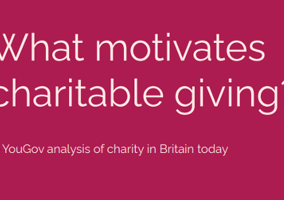Just over half (53%) of Britons think charities are too corporate and “have lost their humanity”, according to a report released last week.
New research from the GOOD Agency and YouGov surveyed people's giving habits for the Giving Britain report. The research found that the public think charities are too focused on making money and are always asking for “more”.
The respondents were concerned with the salaries of senior charity staff, and one participant said “some of the salaries at the top of charities are like [that of] a really big business”.
Made up of 4,140 respondents, the Giving Britain report used quantitative and qualitative research to gather its findings, as well as a representative focus group of nine people.
The report found that 51% of respondents (one in two) say donating to charity is a bottomless pit, with cynicism greater in older generations.
It also uncovered that 43% of those surveyed no longer think charities are the best way to solve social problems.
The study also found that three out of four of people want “charities to give a hand up, not a hand out”.
In response to the findings, GOOD Agency stated that “charities need to communicate their humanity and influence. Otherwise, they risk being viewed as a money-making machine, a 'bottomless pit'. This communication is crucial as they compete for donors’ attention, time and money. The motivation to donate and help is still present; with one in two respondents agreeing that charities are unique because they put people before profit”.
‘The uncomfortable truths’
The report lists six “uncomfortable truths” about Britain’s giving behaviours.
- Older audience are the biggest cynics – the study found older givers give habitually out of a sense of duty, with 63% of seniors born in 1945 or before believing “donating to charity is a bottomless pit – they always seem to need more money”, compared to 52% of Gen X (born 1956-81).
- Charities sideline younger givers who believe in charity most – Though younger generations reported “higher belief” in charities, 42% had no engagement of any kind with charities in the last three months compared to 29% of over 60s. GOOD argues “there is an urgent need to balance this tension between ‘belief in charities’ and lack of action”.
- People think that charities are profiteering – The research uncovered that the way in which charities “ask” for donations was a leading reason for not giving. 53% of Britons believe charities are too corporate and “have lost their humanity”.
- Subscription boxes have not saved regular giving – regular giving is in decline, with 2.1 million regular givers lost in the past five years. 33% of respondents set up a regular gift compared to just 4% signing up to a charity subscription service.
- Charity silos stop supporters taking further action – there is a large crossover in how people support charities.
- Most people think charities should not be political - 59% of respondents believe charities should not take political position and “it’s not their role”.
The positive insights
The report also showed positive attitudes to the sector:
- 73% agree that charities are important because they encourage everyone to be a little more kind.
- 79% agree that charities are vital because they help the most vulnerable.
- One in two respondents agreed that charities are unique because they put people before profit, with this sentiment felt the strongest amongst Gen-Z (67%).
- Younger people report higher belief in charities - with almost half of millennials reporting that donating to charity gives them the power to change the things they care about.
- GOOD said “‘Make it happen’ is the top message that convinces our respondents to give”, meaning active language promotes the most giving from donors.
Chris Norman, chief executive and founder of GOOD, said: “At GOOD we have been working with charities and not-for-profits for the last 26 years. We know that individual giving is critical to so many organisations if vital services are to continue. We have commissioned this research to help unlock the innate compassion we know resides in the British public to help motivate giving. We hope the report will help inspire fundraisers and charity professionals overcome barriers and transform the future.”
Related articles












